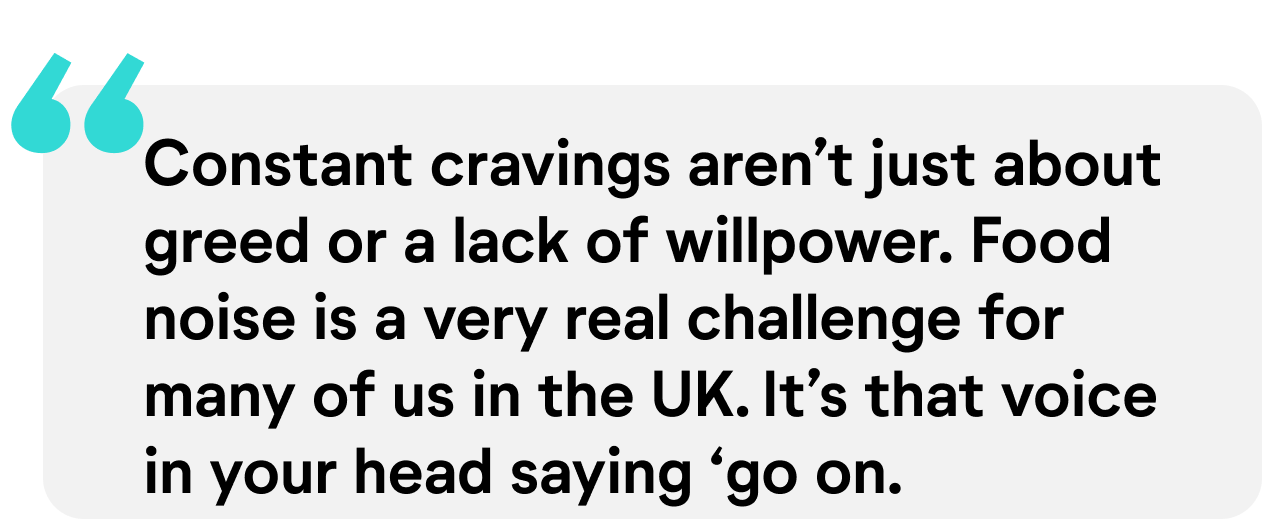Almost a third of us are guilty of raiding the fridge at night, after we’ve had our dinner, according to our new nationwide survey of over 2,000 UK adults. It’s only natural to fancy a snack in the evening, even if you’re not hungry.
This late-evening urge is often fuelled by something called food noise, which is the constant, intrusive thoughts about eating, even when your body doesn’t need the fuel. And for many, those thoughts seem to get louder as the day winds down.
What we mean by food noise
Food noise is the everyday term for the brain’s habit of lighting up and sparking cravings when you’re exposed to food-related triggers. These cues can be external (like the smell of popcorn or a TV ad for pizza) or internal (like imagining a favourite dessert).
In our survey, just 25% of people had heard the term ‘food noise’ before, but once we explained it, a huge 84% recognised the feeling. For some, it’s an occasional distraction; for others, it’s like a soundtrack playing in the background of their mind all day.
Those who are overweight or living with obesity were twice as likely to say their thoughts about food feel uncontrollable, and far more likely to notice them intensify at night.
Why food noise gets louder after dark
There’s no single reason; rather, a combination of body rhythms, hormone changes, mood shifts, and daily habits come together to make evenings a perfect storm for cravings.
Fewer distractions
During the day, work, social activities, and errands keep your mind busy. But at night, the pace slows. With fewer tasks competing for your attention, there’s more mental space for intrusive food thoughts to creep in. That chocolate bar in the cupboard suddenly feels louder than it did at lunchtime.
Your body clock and hunger hormones
Our appetite is partly governed by the circadian rhythm, which is the body’s internal 24-hour clock. Ideally, hunger hormones like ghrelin (which increases appetite) and leptin (which signals fullness) are in sync with our eating patterns. But late-night eating, irregular meal times, or disrupted sleep can throw this rhythm out of balance. Some studies show that ghrelin levels can be higher in the evening, which may amplify cravings even if you’ve eaten enough during the day.1
Emotional load
Our survey found boredom (33%), stress (24%), and low mood (24%) among the top emotional triggers for food noise. And these feelings tend to accumulate over the day. By the evening, you might feel more inclined to use food as comfort or distraction, especially high-calorie “treat” foods that light up the brain’s reward centres.
Environmental temptations
The modern evening routine often involves winding down in front of the TV, but that also means exposure to food adverts. Add in easy access to snacks at home, and you’ve got a perfect set-up for cravings to strike. In our study, 35% blamed the ready availability of fast food and 24% pointed to snack placement in shops as top triggers.
The fact that 6 million tonnes of food is wasted in households each year suggests that cravings, rather than hunger, is the driving cause of overeating at home.

Strategies to quiet food noise at night
While not every late-night craving can (or should) be eliminated, you can make them easier to manage.
1. Plan balanced meals: Spreading your food intake evenly across the day (with enough protein, healthy fats, and fibre) can help keep hunger hormones stable. Skipping meals or overly restricting during the day often leads to stronger cravings at night.
2. Identify emotional triggers: Keep a short journal for a week noting when nighttime cravings strike, what you’re doing, and how you’re feeling. Patterns like boredom after TV or stress after a long day can emerge, giving you clues about what to address.
3. Adjust your environment: Keep tempting snacks out of immediate reach or out of sight, and avoid stocking foods you typically crave late at night. Replace mindless TV scrolling with an activity that keeps your hands and mind busy.
4. Try mindfulness techniques: Approaches like guided meditations, breathing exercises, or mindful eating can help you pause and decide whether you’re truly hungry or simply responding to food noise.
The numan take
Nighttime food noise can disrupt sleep, cause indigestion, and leave you feeling frustrated with your eating habits. Over time, it may contribute to weight gain or make weight loss harder. And yet, 65% of people still believe willpower is the main factor in whether or not they snack. We say that’s outdated thinking, as food noise is influenced by biology and psychology, and not just discipline.
References
Hayashi D, Edwards C, Emond JA, Gilbert-Diamond D, Butt M, Rigby A, et al. What is food noise? A conceptual model of food cue reactivity. Nutrients. 2023;15(22): 4809.





